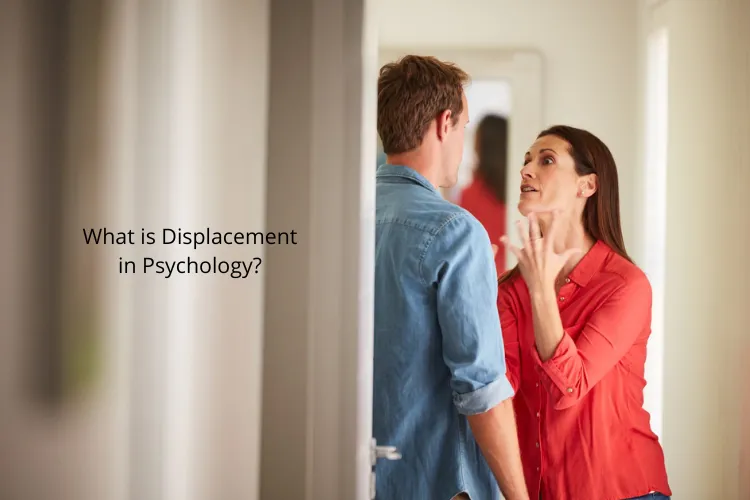Has someone made you feel angry, sad, or fearful but couldn’t respond? Have you ever endured a stressful day at work or school, then came home and taken out your frustration on your loved ones? Have you binged eaten because you feel bad about something you did? Or in anger have you shut the door or broken things? What about a time when you had an argument with your partner, then got in your car and found your patience waning with every driver on road? If yes then there is a simple and short term called “Displacement Psychology”. Displacement is basically to shift or to move while in psychology it is a defensive tactic/ mechanism wherein a person transfers his or her negative emotions and frustrations to another entity in order to get rid of them.
What is Displacement in Psychology?
Displacement is basically to shift or to move while in psychology it is a defensive tactic/ mechanism wherein a person transfers his or her negative emotions and frustrations to another entity in order to get rid of them. As per the American Psychological Association, people use defensive mechanisms to avoid or discharge unpleasant thoughts and feelings. This concept was established by Sigmund Freud in psychoanalytic theory, where the frame of reference to one of the defensive mechanisms, allows all of us to secure our minds against experiences and thoughts that are too tough for our conscious mind to cope with. Displaced aggressiveness is a common type of defense and it acts like a cycle. If a person is furious but cannot direct their fury toward the source without consequences, they may “take it out” on someone or something less threatening. Although this method may be beneficial to a person’s mental health, it can cause issues in relationships if used frequently.
Are you facing trouble in your relationships? Speak to our mental Wellness Experts at Ganeshaspeaks.com
What are the Purpose and Causes of Displacement?
The objective of this unconscious defensive mechanism is normally to release pent-up emotions by redirecting them elsewhere, causing minimal or no harm to the individual experiencing those feelings. Displacement occurs when we shift our emotions and behaviors away from the originally planned goal and toward a substitute target: depending on individual perceptions and judgments about the circumstances or due to a lack of ability to deal with the problem. For example, the girl is really furious with her boss, but she can’t take action because she is frightened of losing her job, so her rage is directed toward her younger sister, whom she believes is a safer target.
At the same time Displacement is a tough thing to address as it may occur in a variety of situations, ranging from relationships to politics. It’s also crucial to understand that not everyone who shows displeasure or anger is displacing—someone may be truly angry without the other person recognizing it.
What are the Impacts of Displacement?
Displacement can have a myriad of implications on an individual and worldwide level. Here are some instances of some of the impacts of displacement:• Inappropriate Emotional Expressions:• Displaced emotions are frequently intense and out of context.
• Relationship Issues: A person who constantly projects work-related rage onto others may find it difficult to develop long-term partnerships. They may push away their friends or family by expressing their anger and frustration towards them which increases the conflicts in relationships. A rebound relationship is also considered to be a form of displacement.
• Bullying: A bully may be the victim of domestic abuse or violence and feel powerless to express his anguish and rage. He then concentrates his rage on less frightening and strong targets at school. This might result in a vicious cycle of conflict. This trend is not confined to infancy; it may also occur during adolescence and maturity. For example, research shows that misplaced rage may play a role in gang violence.
• Cycles of Anger and Negativity: Displacement frequently occurs as a chain reaction and does not generally end with a single incidence. For example, if you yell at a friend, the friend will get enraged at her lover, the lover will become enraged at a server, and the bartender will become enraged at a stray dog. As a result, the chain of events continues, and only a little trigger is required to cause the reaction.
• Prejudice: Displacement may drive a person to direct their rage at a certain group of individuals. For example, if a person is unable to find a new job after being laid off, they may begin to blame immigrants for their inability to find work.
• Scapegoating: Relocation may help explain why people frequently blame large-scale economic or societal issues on others. On a lesser scale, it may also happen in everyday situations. A person, for example, may have a difficult journey before arriving at a messy house. They may later blame their partner or roommate for the incident, even if it was caused by someone or something else.
• Addiction and Substance Misuse Problems: Addiction can be exacerbated by emotions of hopelessness and powerlessness. These feelings generate a burst of anger, which can obscure people’s judgment. When that rage isn’t aimed toward the person or incident that sparked it, drinking or using drugs acts as a sort of self-control, a method to restore autonomy and power. If this pattern persists, it may foster an addiction to alcohol, drugs, or compulsive behaviors.
Displacement can be an incredible source of dramatic irony, with the reader knowing the reasons behind the character’s actions and the other characters left in the dark – MJ Bush.
Displacement can hamper your mental health and strain your relationships with others. To get an insight into your emotional and behavioral patterns.



